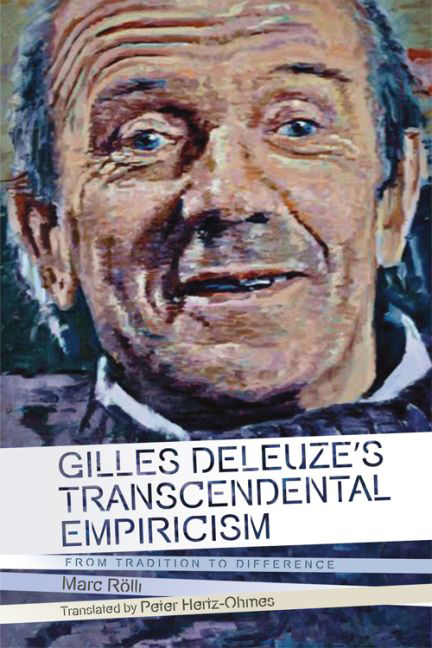Book contents
- Frontmatter
- Contents
- Translator's Note
- Author's Foreword
- Introduction: Can Empiricism Have a Transcendental Aspect?
- PART I EMPIRICISM/TRANSCENDENTALISM
- PART II FROM PHENOMENON TO EVENT
- PART III DELEUZE'S TRANSCENDENTAL EMPIRICISM
- 6 The Paradoxical Nature of Difference
- 7 Virtuality of Concepts
- 8 Subjectivity and Immanence
- Conclusion: Where Do We Go from Here? Lines of Flight
- Bibliography
- Index
7 - Virtuality of Concepts
from PART III - DELEUZE'S TRANSCENDENTAL EMPIRICISM
Published online by Cambridge University Press: 27 April 2017
- Frontmatter
- Contents
- Translator's Note
- Author's Foreword
- Introduction: Can Empiricism Have a Transcendental Aspect?
- PART I EMPIRICISM/TRANSCENDENTALISM
- PART II FROM PHENOMENON TO EVENT
- PART III DELEUZE'S TRANSCENDENTAL EMPIRICISM
- 6 The Paradoxical Nature of Difference
- 7 Virtuality of Concepts
- 8 Subjectivity and Immanence
- Conclusion: Where Do We Go from Here? Lines of Flight
- Bibliography
- Index
Summary
Empiricism is generally confronted with the preconceived notion that it carelessly disregards actual thought processes. The rejection of a priori sources for concepts, unanimously ascribed to empiricism by Kantian and Hegelian tradition, appears as general denial of philosophical reflection and its claims regarding a categorial mediation of experience. This classic condemnation of empiricism has rooted itself so deeply in continental thought that the non-positivist critique of metaphysics from Schopenhauer to Derrida, while no doubt making use of empiricist theorems, does so only with negative intent and careful delimitation (see Derrida 1988: 127). It seems paradoxical to this critique to conceive pure experience conceptually: therefore sensible immediacy functions merely as a non-identical corrective that sheds light on the deficient or abstractly subsumptive character of philosophical concepts. Nietzsche has formulated this critical aspect of empiricist abstraction theory in a particularly effective way in his treatise ‘On Truth and Lies in a Nonmoral Sense’.
This instrumental character of the concept, as described by Nietzsche, defines its pragmatic truth value. Concepts are set up in the empirical milieu of singular events, to which they are related genetically – through a reduction of complexity. At the same time they take on a nihilist tendency as soon as they are freed from the status of their genesis and claim validity as pure logical predicates. The Critical Theory of the Frankfurt School also makes use of this figure of thought in order to reflect especially on the unavoidable impairment and distortion of the given within the concept. Nevertheless, that theory fixes the concept's traditional form using historical-philosophical means.
What we differentiate will appear […] negative for just as long as the structure of our consciousness obliges it to strive for unity: as long as its demand for totality will be its measure for whatever is not identical with it.
(Adorno 1981: 5–6)The negativist conception of difference corresponds, says Adorno, to the constitution of consciousness in the blinding context of capitalist working conditions. His analysis presupposes the factual incapability of contemporary thought to affirm differences, a hopeless situation that can at best receive only critical reflection.
- Type
- Chapter
- Information
- Gilles Deleuze's Transcendental EmpiricismFrom Tradition to Difference, pp. 165 - 223Publisher: Edinburgh University PressPrint publication year: 2016



